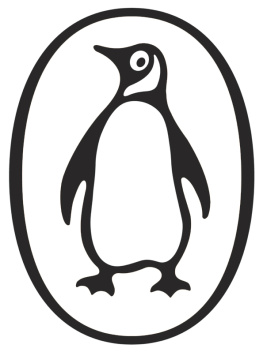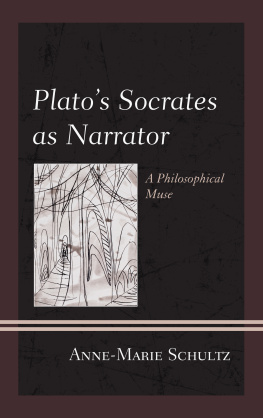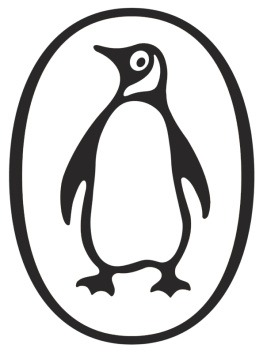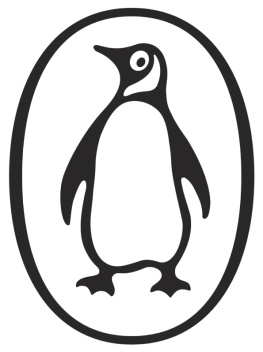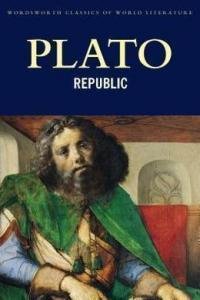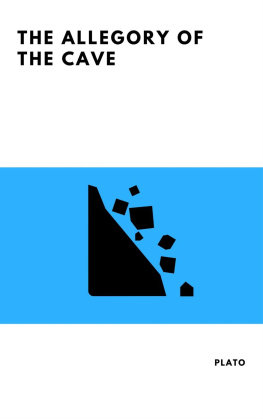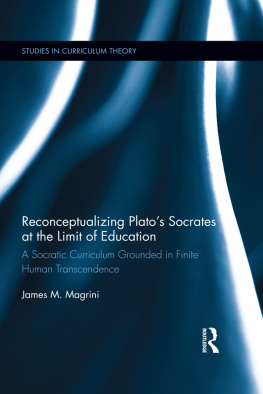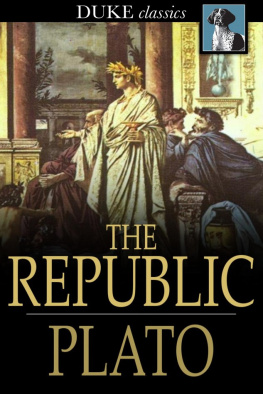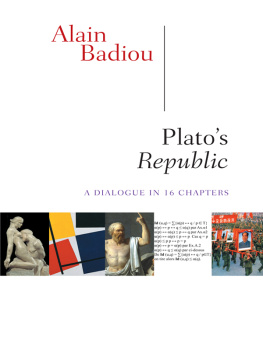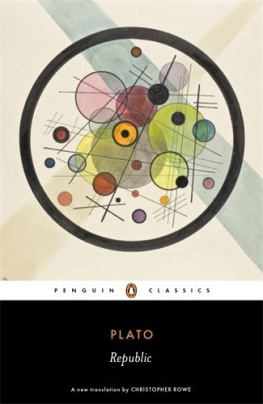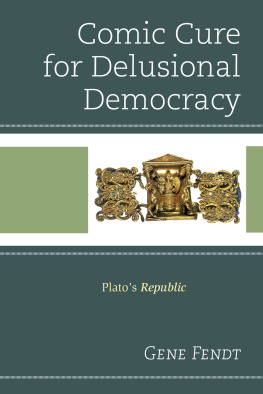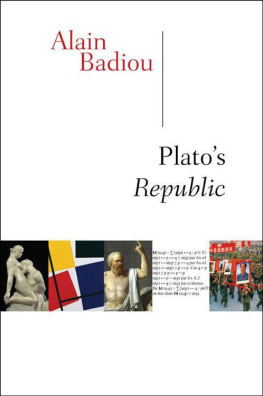About Plato:Plato (Greek: Pltn, "wide, broad-shouldered") (428/427 BC 348/347 BC) was an ancient Greek philosopher, the second of thegreat trio of ancient Greeks Socrates, Plato, originally namedAristocles, and Aristotle who between them laid the philosophicalfoundations of Western culture. Plato was also a mathematician,writer of philosophical dialogues, and founder of the Academy inAthens, the first institution of higher learning in the westernworld. Plato is widely believed to have been a student of Socratesand to have been deeply influenced by his teacher's unjust death.Plato's brilliance as a writer and thinker can be witnessed byreading his Socratic dialogues. Some of the dialogues, letters, andother works that are ascribed to him are considered spurious. Platois thought to have lectured at the Academy, although thepedagogical function of his dialogues, if any, is not known withcertainty. They have historically been used to teach philosophy,logic, rhetoric, mathematics, and other subjects about which hewrote. Source: Wikipedia
Also available on FeedbooksPlato:- TheComplete Plato (-347)
- Apology(-400)
- Symposium(-400)
- Charmides(-400)
- Protagoras(-400)
- Statesman(-400)
- Ion(-400)
- Meno(-400)
- Crito(-400)
- Laches(-400)
Note: This book is brought toyou by Feedbooks
http://www.feedbooks.com
Strictly for personal use, do not use this file for commercialpurposes.
INTRODUCTION AND ANALYSIS.
The Republic of Plato is the longest of his works with theexception of the Laws, and is certainly the greatest of them. Thereare nearer approaches to modern metaphysics in the Philebus and inthe Sophist; the Politicus or Statesman is more ideal; the form andinstitutions of the State are more clearly drawn out in the Laws;as works of art, the Symposium and the Protagoras are of higherexcellence. But no other Dialogue of Plato has the same largenessof view and the same perfection of style; no other shows an equalknowledge of the world, or contains more of those thoughts whichare new as well as old, and not of one age only but of all. Nowherein Plato is there a deeper irony or a greater wealth of humour orimagery, or more dramatic power. Nor in any other of his writingsis the attempt made to interweave life and speculation, or toconnect politics with philosophy. The Republic is the centre aroundwhich the other Dialogues may be grouped; here philosophy reachesthe highest point (cp, especially in Books V, VI, VII) to whichancient thinkers ever attained. Plato among the Greeks, like Baconamong the moderns, was the first who conceived a method ofknowledge, although neither of them always distinguished the bareoutline or form from the substance of truth; and both of them hadto be content with an abstraction of science which was not yetrealized. He was the greatest metaphysical genius whom the worldhas seen; and in him, more than in any other ancient thinker, thegerms of future knowledge are contained. The sciences of logic andpsychology, which have supplied so many instruments of thought toafter-ages, are based upon the analyses of Socrates and Plato. Theprinciples of definition, the law of contradiction, the fallacy ofarguing in a circle, the distinction between the essence andaccidents of a thing or notion, between means and ends, betweencauses and conditions; also the division of the mind into therational, concupiscent, and irascible elements, or of pleasures anddesires into necessary and unnecessarythese and other great formsof thought are all of them to be found in the Republic, and wereprobably first invented by Plato. The greatest of all logicaltruths, and the one of which writers on philosophy are most apt tolose sight, the difference between words and things, has been moststrenuously insisted on by him (cp. Rep.; Polit.; Cratyl), althoughhe has not always avoided the confusion of them in his own writings(e.g. Rep.). But he does not bind up truth in logicalformulae,logic is still veiled in metaphysics; and the sciencewhich he imagines to 'contemplate all truth and all existence' isvery unlike the doctrine of the syllogism which Aristotle claims tohave discovered (Soph. Elenchi).
Neither must we forget that the Republic is but the third partof a still larger design which was to have included an idealhistory of Athens, as well as a political and physical philosophy.The fragment of the Critias has given birth to a world-famousfiction, second only in importance to the tale of Troy and thelegend of Arthur; and is said as a fact to have inspired some ofthe early navigators of the sixteenth century. This mythical tale,of which the subject was a history of the wars of the Atheniansagainst the Island of Atlantis, is supposed to be founded upon anunfinished poem of Solon, to which it would have stood in the samerelation as the writings of the logographers to the poems of Homer.It would have told of a struggle for Liberty (cp. Tim.), intendedto represent the conflict of Persia and Hellas. We may judge fromthe noble commencement of the Timaeus, from the fragment of theCritias itself, and from the third book of the Laws, in what mannerPlato would have treated this high argument. We can only guess whythe great design was abandoned; perhaps because Plato becamesensible of some incongruity in a fictitious history, or because hehad lost his interest in it, or because advancing years forbade thecompletion of it; and we may please ourselves with the fancy thathad this imaginary narrative ever been finished, we should havefound Plato himself sympathising with the struggle for Hellenicindependence (cp. Laws), singing a hymn of triumph over Marathonand Salamis, perhaps making the reflection of Herodotus where hecontemplates the growth of the Athenian empire'How brave a thingis freedom of speech, which has made the Athenians so far exceedevery other state of Hellas in greatness!' or, more probably,attributing the victory to the ancient good order of Athens and tothe favor of Apollo and Athene (cp. Introd. to Critias).
Again, Plato may be regarded as the 'captain' ('arhchegoz') orleader of a goodly band of followers; for in the Republic is to befound the original of Cicero's De Republica, of St. Augustine'sCity of God, of the Utopia of Sir Thomas More, and of the numerousother imaginary States which are framed upon the same model. Theextent to which Aristotle or the Aristotelian school were indebtedto him in the Politics has been little recognised, and therecognition is the more necessary because it is not made byAristotle himself. The two philosophers had more in common thanthey were conscious of; and probably some elements of Plato remainstill undetected in Aristotle. In English philosophy too, manyaffinities may be traced, not only in the works of the CambridgePlatonists, but in great original writers like Berkeley orColeridge, to Plato and his ideas. That there is a truth higherthan experience, of which the mind bears witness to herself, is aconviction which in our own generation has been enthusiasticallyasserted, and is perhaps gaining ground. Of the Greek authors whoat the Renaissance brought a new life into the world Plato has hadthe greatest influence. The Republic of Plato is also the firsttreatise upon education, of which the writings of Milton and Locke,Rousseau, Jean Paul, and Goethe are the legitimate descendants.Like Dante or Bunyan, he has a revelation of another life; likeBacon, he is profoundly impressed with the unity of knowledge; inthe early Church he exercised a real influence on theology, and atthe Revival of Literature on politics. Even the fragments of hiswords when 'repeated at second-hand' (Symp.) have in all agesravished the hearts of men, who have seen reflected in them theirown higher nature. He is the father of idealism in philosophy, inpolitics, in literature. And many of the latest conceptions ofmodern thinkers and statesmen, such as the unity of knowledge, thereign of law, and the equality of the sexes, have been anticipatedin a dream by him.


